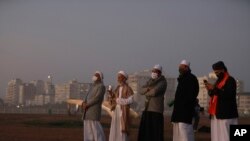Muslims across South Africa are pushing back against a decision last week by the home affairs minister, who said his department cannot legally recognize Muslim marriages.
The controversy erupted after the minister, Aaron Motsoaledi, said death certificates cannot indicate that someone was married unless the marriage is considered valid under South African law.
Since 1994, under African National Congress rule, South Africa has recognized only African customary marriages. Religious marriages, including Muslim marriages, are considered invalid.
“A marriage entered into in terms of Muslim rites is thus far not recognized in South Africa,” Motsoaledi said, replying to a written parliamentary question by Al Jama-ah party leader Ganief Hendricks. “The department would not have powers to indicate that a person is married in the death certificate, whereas such is not the case in terms of the law.”
Hendricks petitioned the government to recognize Muslim marriages, known as nikah. He says he was motivated by the deaths of Muslims from COVID-19, the disease caused by the novel coronavirus.
When a Muslim man dies from COVID-19, "then all those widows who were married for 40 years ... get a death certificate and the death certificate says ‘never married,''' Hendricks said. "And that has stunned so many of these Muslim women.”
There are no official figures as to how many South Africa Muslims have died from COVID-19. Overall, South Africa had reported just over 58,500 cases and 1,210 deaths as of Thursday, according to Johns Hopkins University researchers.
Burden on survivors
The government’s refusal to recognize Muslim marriages has had a significant impact on women and children.
“Muslim women have a right to dignity,” Hendricks said. “When their children are born, the children are illegitimate if they are not in a nikah. If their spouse dies, their death certificate says ‘never married.’ So their dignity is harmed from the cradle to the grave. That is unacceptable in a democratic South Africa.”
The Women’s Legal Center in South Africa has been fighting to change the Muslim marriage status.
“The courts don’t recognize their marriage, and so they are subjected to whatever informal, nonlegal processes are put in place in terms of religion to deal with the division of estate in the instance of divorce," said Charlene May, an attorney at the center.
In 2018, the center won a case in the Western Cape High Court that ruled the government must legalize Muslim marriages within two years.
The state challenged the ruling, and the Supreme Court of Appeal is set to review the case.
Marriage bill in the works
The government has a responsibility to intervene, according to May.
“If women aren’t able to access rights like any other woman in a legally recognized marriage can access, then that is a form of discrimination,” May said. “And then the state does have an obligation and a duty to step into the space that has been created, and the state has an obligation to legislate.”
The Department of Home Affairs is working on an omnibus marriage bill. But party leader Hendricks worries it could take years to pass.
“We can’t wait four years to do public participation, drafting,” Hendricks said. “All we want in the act is that Muslim marriage is a valid marriage just like a gay marriage.”
But Siya Khoza, speaking on behalf of the home affairs minister, said in a statement that deliberations on a new marriage policy are advancing to reflect marriages and practices in modern-day South Africa. The government hopes to have the legislation finalized by next March, according to Khoza.
This report originated in VOA’s English to Africa service.




